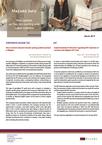
Mazars Info - March 2019
INCOME TAX
New round of extensive transfer pricing audits launched in Belgium
As in past years, the Belgian tax authorities have in February sent a large number of Belgian companies an extensive transfer pricing request for information (31 standard questions). This number transfer pricing audits on the financial years 2016 and 2017 may hit several clients. Taxpayers need to be well prepared when answering these questions.
The audit wave is initiated by the specialized Transfer Pricing Audit Team ("Centrum GO Cel Verrekenprijzen") and the selection of companies targeted by the TP audit occurs via data mining in the majority of cases. Companies incurring losses, undergoing business restructurings or reporting fluctuating financial results seem being more systematically targeted.
This type of specialized TP audit starts with a request to complete a lengthy transfer pricing questionnaire ("vraag om inlichtingen") on the company’s overall business, intra-group transactions, functions, risks and (in)tangible assets. The company is free to request the tax administration to receive an identical English version of the Dutch or French original questionnaire.
The company needs to provide a written response to the questionnaire within a short 1 month timeframe. The company however has the opportunity to request a pre-audit meeting, which must take place prior to the 1 month response due date expiry, to discuss the list of information prior to answering the questionnaire in writing. Experience shows that the 1st round of exchange of information may have a significant impact on the further evolution of the audit. Hence, Mazars strongly recommend each company to request a pre-audit meeting prior to sharing documents and data.
VAT
Implementation EU Directive regarding VAT treatment of vouchers into Belgian VAT Code
In order to create further harmonization with respect to the VAT treatment of vouchers at European level, a Directive was issued in 2016. The implementation into Belgian law of these provisions was recently approved at the Parliament on February 22, 2019.
A voucher, physical or electronic, is defined as an instrument which has to be accepted as consideration for a supply or services. The goods or services to be supplied or the potential suppliers are indicated on the voucher itself or in the related documentation. Only vouchers which are used for redemption against goods or services are targeted by the new rules, discount vouchers are thus excluded.
The VAT treatment depends on the characteristics of the voucher. Therefore, it is necessary to make a distinction between two types of vouchers and their respective VAT treatment:
- Single purpose-vouchers: a voucher where the place of supply of the goods or services and the VAT due is known at the time of issuance of the voucher. VAT will become chargeable upon time of issuance as the VAT treatment is already determinable (e.g. a voucher for a book).
- Multiple purpose-vouchers: any voucher other than a single-purpose voucher. In this case, the VAT treatment is not determinable upon time of issuance resulting in which the VAT will become chargeable when the goods or services to which the voucher relates are supplied (e.g. a voucher for hotel stay in a country of choice).
The new rules are applicable on vouchers issued as of 1 January 2019.
GLOBAL MOBILITY SERVICES
Foreign equity plans and benefits: Belgian tax reporting and new withholding tax and social security obligations
Prior to December 31, 2017, when foreign companies granted stock options to employees of their Belgian subsidiaries, such option grants, provided that the options complied with the Belgian stock option law, were taxable at grant and they needed to be reported by the (Belgian) employing subsidiary on the employee’s tax form 281.10. This reporting obligation was mandatory, irrespective of whether the Belgian subsidiary was involved in the option grant or included the stock options in its financial statements.
These reporting obligations have been extended to all benefits such as equity incentives (e.g. free shares, shares at a discounted price, Restricted Stock Units, ...) and will be mandatory regardless of whether the Belgian company acts as intermediary in the grant process or whether the related costs are recharged to the Belgian entity. It is currently not yet clear when this change will enter into force, but it might still be retroactively as from January 1, 2019.
Next to the reporting obligation, there will also be an obligation to calculate Belgian wage withholding taxes on the benefits. Currently, it is foreseen that the wage withholding tax requirement will most likely enter into force as from March 1, 2019.
Additionally, the Belgian social security authorities have adjusted their point of view regarding the application of Belgian social security contributions on benefits granted by foreign companies to employees of a Belgian employer. In case e.g. RSU’s or other benefits are not directly offered by a Belgian employer, but by a related party of the group, Belgian social security contributions (employer and employee) will be applicable.
In case you, as a Belgian company or employee or director would be impacted by this foreseen law changes, we recommend to verify the potential impact of the above and act proactively. We will keep you updated once the law will be published.
LEGAL
New Belgian Companies and Associations Code approved
The die has been cast!
After years of preparation, the federal parliament voted in favour of the introduction of the New Belgian Company and Associations Code on 28 February 2018 (BCC).
The new BCC is a huge reform of Belgian company law, aiming to make it more simple and flexible.
Taking into account the changes, this will have a major impact on all Belgian companies.
Important changes include the reduction of the number of company’s forms, the flexibilization of the rules applicable to the private limited liability company (including the abolition of the capital requirement), the introduction of a liability cap for directors, the introduction of multiple voting shares,…
As a result of this approval, the new BCC will come into force as from 1 May 2019.
More information on the new BCC can be found on our website or by clicking here.



